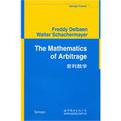套利数学
出版时间:2010-9 出版社:世界图书出版公司 作者:戴尔贝恩 页数:373
Tag标签:无
内容概要
in 1973 f. black and m. scholes published their pathbreaking paper [bs 73]on option pricing. the key idea -- attributed to r. melton in a footnote of the black-scholes paper -- is the use of trading in continuous time and the notion of arbitrage. the simple and economically very convincing ''principle of no-arbitrage" allows one to derive, in certain mathematical models of financial markets (such as the samuelson model, [s 65], nowadays also referred to as the "black-scholes" model, based on geometric brownian motion), unique prices for options and other contingent claims.this remarkable achievement by f. black, m. scholes and r. merton had a profound effect on financial markets and it shifted the paradigm of deal-ing with financial risks towards the use of quite sophisticated mathematical models.
书籍目录
part i a guided tour to arbitrage theory 1 the story in a nutshell 1.1 arbitrage 1.2 an easy model of a financial market 1.3 pricing by no-arbitrage 1.4 variations of the example 1.5 martingale measures 1.6 the fundamental theorem of asset pricing 2 models of financial markets on finite probability spaces 2.1 description of the model 2.2 no-arbitrage and the fundamental theorem of asset pricing 2.3 equivalence of single-period with multiperiod arbitrage 2.4 pricing by no-arbitrage 2.5 change of numeraire 2.6 kramkov's optional decomposition theorem 3 utility maximisation on finite probability spaces 3.1 the complete case 3.2 the incomplete case 3.3 the binomial and the trinomial model 4 bachelier and black-scholes 4.1 introduction to continuous time models 4.2 models in continuous time 4.3 bachelier's model 4.4 the black-scholes model 5 the kreps-yan theorem 5.1 a general framework 5.2 no free lunch 6 the dalang-morton-willinger theorem 6.1 statement of the theorem 6.2 the predictable range 6.3 the selection principle 6.4 the closedness of the cone c 6.5 proof of the dalang-morton-willinger theorem for t=1 6.6 a utility-based proof of the dmw theorem for t=1 6.7 proof of the dalang-morton-willinger theorem for t≥1 by induction on t 6.8 proof of the closedness of k in the case t≥1 6.9 proof of the closedness of c in the case t≥1 under the (na) condition 6.10 proof of the dalang-morton-willinger theorem for t>1 using the closedness of c 6.11 interpretation of the l∞-bound in the dmw theorem 7 a primer in stochastic integration 7.1 the set-up 7.2 introductory on stochastic processes 7.3 strategies, semi-martingales and stochastic integration 8 arbitrage theory in continuous time: an overview 8.1 notation and preliminaries 8.2 the crucial lemma 8.3 sigma-martingales and the non-locally bounded case part ii the original papers 9 a general version of the fundamental theorem of asset pricing (1994) 9.1 introduction 9.2 definitions and preliminary results 9.3 no free lunch with vanishing risk 9.4 proof of the main theorem 9.5 the set of representing measures 9.6 no free lunch with bounded risk 9.7 simple integrands 9.8 appendix: some measure theoretical lemmas 10 a simple counter-example to several problems in the theory of asset pricing (1998) 10.1 introduction and known results 10.2 construction of the example 10.3 incomplete markets 11 the no-arbitrage property under a change of numeraire (1995) 11.1 introduction 11.2 basic theorems 11.3 duality relation 11.4 hedging and change of numeraire 12 the existence of absolutely continuous local martingale measures (1995) 12.1 introduction 12.2 the predictable radon-nikodym derivative 12.3 the no-arbitrage property and immediate arbitrage 12.4 the existence of an absolutely continuous local martingale measure 13 the banach space of workable contingent claims in arbitrage theory (1997) 13.1 introduction 13.2 maximal admissible contingent claims 13.3 the banach space generated by maximal contingent claims 13.4 some results on the topology of 13.5 the value of maximal admissible contingent claims on the set me 13.6 the space under a numeraire change 13.7 the closure of g∞ and related problems 14 the fundamental theorem of asset pricing for unbounded stochastic processes (1998) 14.1 introduction 14.2 sigma-martingales 14.3 one-period processes 14.4 the general rd-valued case 14.5 duality results and maximal elements 15 a compactness principle for bounded sequences of martingales with applications (1999) 15.1 introduction 15.2 notations and preliminaries 15.3 an example 15.4 a substitute of compactness for bounded subsets of h1 15.4.1 proof of theorem 15.a 15.4.2 proof of theorem 15.c 15.4.3 proof of theorem 15.b 15.4.4 a proof of m. yor's theorem 15.4.5 proof of theorem 15.d 15.5 application part iii bibliography references
章节摘录
Let us turn back to the no-arbitrage theory developed in Chap. 2 to raise againthe question: what can we deduce from applying the no-arbitrage principlewith respect to pricing and hedging of derivative securities? While we obtained satisfactory and mathematically rigorous answers tothese questions in the case of a finite underlying probability space inChap. 2, we saw in Chap. 4, that the basic examples for this theory, theBachelier and the BlackScholes model, do not fit into this easy setting, asthey involve Brownian motion. In Chap. 4 we overcame this difficulty either by using well-known resultsfrom stochastic analysis (e.g., the martingale representation Theorem 4.2.1for the Brownian filtration), or by appealing to the faith of the reader, thatthe results obtained in the finite case also carry over —— mutatis mutandis ——to more general situations, as we did when applying the change of num~rairetheorem to the calculation of the Black-Scholes model.
图书封面
图书标签Tags
无
评论、评分、阅读与下载
用户评论 (总计6条)
- 数学要求颇高
- 前提是英语要好,并且高数也要好*
- 全e文,看的非常的费力
- 数学套利
- 还没有看,只翻了翻应该不错
- 看起来有点费力,不过有能力还是读一下
推荐图书
- 世界上下五千年-全三册
- 世界通史(上中下)
- 企业组织与环境
- 保险代理从业人员资格考试复习指南
- 蒋介石的五大王牌军
- 結婚、する?
- るるぶ上海11
- 20日で合格るぞ!日商簿記2級 光速マスターテキスト
- 国试书业·现代教育技术试卷
- 国试书业·现代设计方法试卷
- 国试书业·幼儿园组织与管理试卷
- 国试书业·小学教育科学研究试卷
- 国试书业·信号与系统试卷
- 国试书业·营养学试卷
- 国试书业·新闻评论写作试卷
- 国试书业·写作试卷
- 普希金诗选
- 全国高等医学院校协编教材
- 国试书业·中外新闻作品研究试卷
- 苔丝
- 国试书业·现代汉语试卷
- 女人没有最好的 只有最适合的
- 培养孩子好性格就这么简单
- 乌龙院大长篇漫画系列(卷33)
- 乌龙院大长篇漫画系列(卷三十三)
